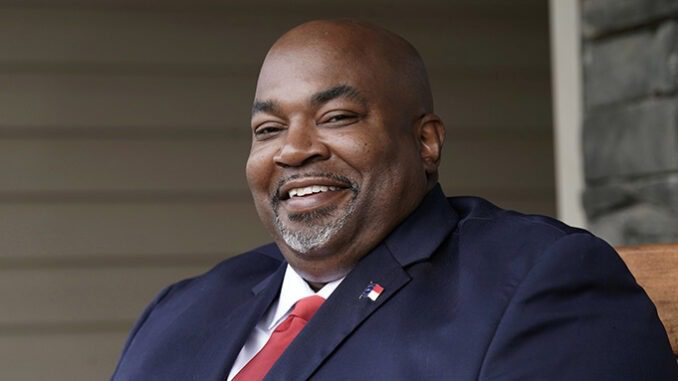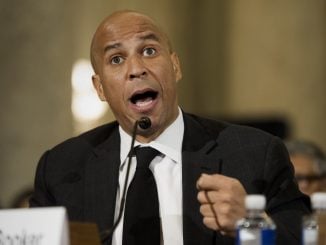
RALEIGH — Mark Robinson, North Carolina’s Republican lieutenant governor-elect, won big on Election Day, with 2,799,018 votes. The vote total is more than other top-of-the-ticket Republicans, like Donald Trump (with 2,756,899 votes), Thom Tillis (with 2,664,001) or Dan Forest (with 2,585,114 votes), received from Tar Heel voters. But Robinson is careful not to fault his fellow Republicans, saying they had to overcome fallout from the coronavirus and had longer political records to defend.
In a Nov. 16 interview with North State Journal, Robinson also said the strong numbers were because he is an “outsider,” adding, “It’s what people are looking for these days. People are looking for fresh faces and new voices.”
Robinson’s campaign manager, Conrad Pogorzelski III, told NSJ that this outsider’s story, along with consistent messaging and a strong volunteer base, is what made the difference.
During his campaign, Robinson frequently told the story of growing up in extreme poverty, and sometimes foster care, in a family with an abusive, alcoholic father and a mother trying to raise 10 children in Greensboro by herself.
“I really hope people will look at me and say, ‘Here’s a guy that came from a poor family and came up working blue collar jobs — just an ordinary person who stepped up, and now he’s the second highest elected official in North Carolina. If he can do this, then doggone it, I can step out in faith and courage and do some things too.’”
Robinson said being a visible example to those growing up in adversity is important to him, especially to young black people who may not have seen a lot of examples of people who look like them in prominent roles. He recalled how when he was young, he would go to the library a lot to read books about history and war, with special interest in stories about military heroes.
“I’d see these pictures of men in the military, and, invariably, they were always white men,” Robinson said. “It kind of made me think, ‘Is there any possibility for me to be a soldier being black? Where are the pictures of black soldiers?’ And I distinctly remember the first time I saw it; I was at church, must have been at Veterans Day or Memorial Day, and I saw a man wearing Marine Corps dress blues, and it literally opened my eyes. And I said, ‘He’s a Marine, and I can be a Marine too.’”
Robinson later joined the military as a medical specialist in the U.S. Army Reserves.
He said another thing that many black youth may need to see modeled publicly is being a black Republican, because those who believe in those conservative principles often feel like they can’t voice them without being ridiculed.
“I think when they see me succeed while standing on these principles, that they too believe in, they’ll say ‘Hey, I can do it,’ and they’ll step out. I think we’ll see more and more black people lean towards the Republican Party and lean towards conservative principles.”
If it was the candidate’s outsider story that won the day, it needed to overcome a massive influx of out-of-state independent funding in support of Robinson’s opponent, state Rep. Yvonne Lewis-Holley (D-Wake).
“We killed it on the fundraising front,” Pogorzelski told NSJ. “But we had Michael Bloomberg come in and drop $8.5 million against us in the last four weeks of the campaign. So we raised more from individuals, but we got outspent heavily because of independent expenditures.”
Pogorzelski said the unusual amount of money spent signaled to him that the Democrats had a larger strategic reason for targeting the race.
“On average, a lieutenant governor’s race like that sees about $2 million spent; ours saw closer to $12 million. He [Bloomberg] absolutely came in and tried to buy this race.”
When asked why Bloomberg would take this level of interest in N.C.’s lieutenant governor’s race, Pogorzelski said, “I can tell you exactly why it is. Roy Cooper wants to run for U.S. Senate in 2022, but doesn’t want to give up the governor’s mansion to a Republican. They were trying to make sure they’d have a Democrat to take his spot in 2022 if he were to run and win the Senate seat.”
Pogorzelski was referring to North Carolina General Statutes 147-11.1, which requires that “The Lieutenant Governor shall become Governor upon the death, resignation, or removal from office of the Governor.” He admits it is only speculation, but said it makes the most sense considering the amount of money put into the race.
But now that Robinson is lieutenant governor-elect, he is moving on — focusing instead on his priorities for office.
Robinson said his “pet project” would be to work with both parties in the General Assembly to make North Carolina’s veterans’ care the nation’s “gold standard.”
“There are nine states that don’t tax veterans’ pensions at all. I’d like to make North Carolina the 10th state that doesn’t,” he said. “Also, I would love to increase programs that care for the severely wounded, elderly and disabled veterans. We really need to cut a lot of red tape involved, especially with our elderly veterans who need a lot of care, so it’s very easy to get the care they need.”
Robinson also said he’s looking forward to his role sitting on the State Board of Education, saying he plans on “bringing a conservative voice to that table and trying to help the newly elected superintendent of public instruction, Catherine Truitt.”
“Absolutely,” Robinson said of whether he will be working with Truitt to try to reopen the state’s schools, which was a campaign priority for her. “We need to start getting these kids back to school. As I travel the state, I’m telling you, I talk to parents who are Republican, Democrat and independent, and all of them tell me they want their children back in school, and their children want to be back in school. We have so many children right now who were A or B students who are now C or D students because they’re disengaged. They need that learning environment.”
Another focus in the education arena for Robinson, who frequently talked about public schools indoctrinating students with left-wing ideology, is examining the curriculum for appropriateness.
“One of the things I want to examine the most is the curriculum. I’ve been hearing a lot of chatter from folks about a lot of the things that the Department of Public Instruction is trying to put inside the curriculum. And some of the stuff is not settling well with me, is not settling well with a lot of parents, and quite honestly, is not settling well with a lot of teachers. So we want to take a good strong look at the curriculum and make sure that we’re teaching our students what they need to know in order to be successful, and we’re not promoting a bunch of social engineering.”
One part of the lieutenant governor role he is not worried about, however, is presiding over the state’s Senate when they are in session.
“I’m sure we’ll be able to handle that, no problem,” Robinson said. “I’ve learned a myriad of things, everything from breaking down an M-16 to how to operate a small business. So I’m sure I can learn to operate Robert’s Rules of Order.”




